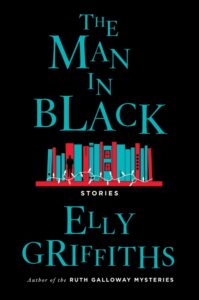‘I didn’t have time to write you a short letter,’ wrote Mark Twain, ‘so I wrote you a long one.’ As with many Twain sayings, the origins of this one are slightly obscure, but the sentiment still rings true. It’s not easy to write short stories. If you only have a few words, then every one of them must count. The best short stories tackle big issues – life, death, time-travel – in only a few pages. Perhaps the form itself allows writers to experiment, to approach themes they couldn’t sustain for a whole book. When I put together my short story collection, The Man in Black, I enjoyed revisiting existing characters but also exploring new ideas. What happens when a boy who doesn’t like books meets Jo March from Little Women? What would happen if you saw a murder from a ski lift? What can prehistoric footprints teach us about living with a terminal illness? Many short stories are set in exotic locations and I really enjoyed sending Ruth and Nelson on a trip down the Nile, following in the wake of my heroine, and champion short story writer, Agatha Christie.
Here are ten of my favourite short stories:
1. The Monkey’s Paw by WW Jacobs
The moral of this story is: be careful what you wish for. An old soldier gives an impoverished couple a mummified monkey’s paw, said to grant three wishes. Ignoring the soldier’s warnings, they wish for two thousand pounds. How this money comes to them is the stuff of nightmares. Yet it’s their third wish that turns the narrative into pure, spine-chilling horror.
2. The Signal Man by Charles Dickens
‘Holloa! Below there!’ These are the first words spoken and yet their meaning is not clear until the very end. The signalman’s job is to receive messages but is he hearing a warning of a tragedy yet to come? Charles Dickens’ ghost story has become a classic and the structure, everything happening in threes, is still the standard for supernatural fiction.
3. The Yellow Wallpaper by Charlotte Perkins Gilman
A woman suffering from ‘nervous depression’ after the birth of a baby is confined to an upstairs room. She becomes obsessed with the yellow wallpaper and, gradually, starts to believe that there is a woman hidden behind it. Is she the woman and, if so, who has imprisoned her? Gilman wrote the novella, first published in 1892, as an attack on the attitudes of the medical profession towards women and, in particular, the treatment of postnatal depression. It’s still just as relevant today.
4. The Double Poet by Alison Lurie
I’m a big fan of Alison Lurie, the American writer who sadly died in 2020. Lurie wrote many excellent novels, including Foreign Affairs, which won the Pulitzer Prize in 1985, but her short stories are also exquisite. ‘The Double Poet’ is narrated by a successful writer on the literary festival circuit. She’s becoming tired and somewhat disorientated. Is this why people keep describing encounters that she can’t remember? Then, one day, she steps onto the stage to discover that her double is already in the spotlight…
5. Three Miles Up by Elizabeth Jane Howard
Elizabth Jane Howard’s short story collection, Mr Wrong, is full of gems, including the title story which will put you off second-hand cars for life. ‘Three Miles Up’ is a chilling little tale that unexpectedly makes the leap into mythology and horror. Two men on a boating trip meet a mysterious woman called Sharon. When they invite her on board, their journey takes a completely different course. The last scene is one of the most chilling things I’ve ever read.
6. The Star by Arthur C Clarke
A Jesuit priest and astronomer is horrified when he discovers the fate of a planet once inhabited by civilised and highly-evolved beings. This is an example of a short story that tackles a huge subject.
7. The Traveller’s Story of the Terribly Strange Bed by Wilkie Collins
A weary traveller seeks refuge in a seedy Parisian gambling house. He’s pleased, and rather surprised, to be offered a comfortable four-poster bed. Then, just as he’s going to sleep, the bed starts to descend into the floor…This story, which was one of Collins’ earliest published works, shows his fascination with bizarre and fantastical crimes.
8. Mrs Todd’s Shortcut by Stephen King
Homer Buckley narrates the story of Ophelia Todd, a woman obsessed with finding shortcuts. After a while Homer notices that many of her routes don’t appear on any map and that Mrs Todd seems to be getting younger by the day. Stephen King is the master of the short story form and I thought about this one a lot when I was writing The Frozen People, a book about disappearing in time.
9. The Witness for the Prosecution by Agatha Christie
It’s hard to believe that this slim story, initially entitled ‘Traitor’s Hands’, inspired two films, a TV series and a very successful stage play. Christie herself wrote the original play script and, in the process, changed the ending. It’s still an absolute classic and, as is often the case with crime fiction, the clue is in the title.
10. Oh Whistle and I’ll Come to You, My Lad by MR James
Every Christmas Eve, Montague Rhodes James, a professor at King’s College, Cambridge, would gather a group of friends together and entertain them with ghost stories. When his work was eventually published, MR James was hailed as the father of folk horror. ]Oh Whistle and I’ll Come to You’ is classic James, combining folklore and archaeology with dry humour – and golf. Read it by a roaring fire…
***


















